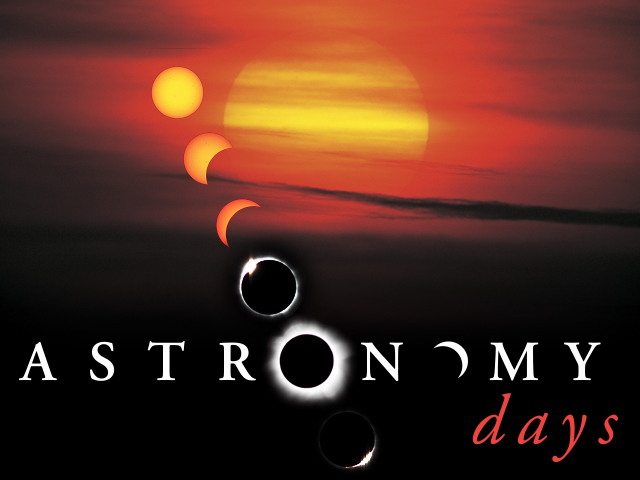Museum sheds light on the Sun and other stars at annual Astronomy Days, Jan. 28-29
For immediate release ‐ January 17, 2017
Contact: Jon Pishney, 919.707.8083. Images available upon request

RALEIGH, N.C. — In case you missed it, this year features the Great American Total Solar Eclipse, the first one visible from the U.S. mainland since 1979. What better time to dive into details of the Sun and other stars, when the North Carolina Museum of Natural Sciences hosts Astronomy Days, Saturday, January 28, 9 a.m.–5 p.m. and Sunday, January 29, noon–5 p.m. Special guests this year include solar eclipse expert Jay Pasachoff and Kuiper Belt discoverer Dave Jewitt. From sun crafts to solar observing, special presentations to rocket launches, space enthusiasts of all ages will find something to do at Astronomy Days. Free.
UCLA astronomer Dave Jewitt was awarded the Kavli Prize in astrophysics and the Shaw Prize in astronomy in 2012. The awards — second in prestige only to the Nobel Prize — were in recognition of his discovery of the Kuiper Belt, a doughnut of icy bodies orbiting beyond Neptune. Confirming the belt’s existence revolutionized scientists’ view of Earth’s neighborhood, leading to Pluto’s demotion to dwarf planet and helping astronomers reconstruct the solar system’s turbulent early history. Jewitt will discuss the “Effect of the Sun on Earth,” Saturday at 1:00 p.m. and Sunday at 12:30 p.m.
Pasachoff is Field Memorial Professor of Astronomy at Williams College and the author of textbooks and tradebooks in astronomy, physics, mathematics and other sciences. Pasachoff has received the Education Prize of the American Astronomical Society and, this year, the Richtmyer Memorial Lecture Award of the American Association of Physics Teachers. The 2017 total eclipse will be the 66th solar eclipse that he has observed. He will be presenting a talk on “This August 21st Solar Eclipse” and identifying the best places to see it in North Carolina, as well as showing photos of past eclipses, Sunday at 2:00 p.m.
Additional presenters include N.C. Museum of Natural Sciences astronomer Rachel Smith, who will highlight current astronomical techniques and tools used to observe young stellar systems; N.C. Museum of Natural Sciences astronomer Patrick Treuthardt, who will discuss his discovery of an extremely rare type of ringed galaxy that recently made international news; NASA/JPL Solar System Ambassador Marc Fusco, who will take a humorous look at the good and bad science in recent space movies; and Raleigh Astronomy Club’s Doug Lively, who will describe the “Top 10 Ways Our Sun Can Kill You” (mature audiences only). Plus, Pamela Gay, host of the podcast “Astronomy Cast,” will be giving a presentation and (maybe) podcasting live.
Aspiring rocketeers can gaze at the 40-foot working models of the Tripoli Rocketry Association. Sun worshipers can peer at the Sun (safely) through solar telescopes provided by the Raleigh Astronomy Club. All visitors can make and blast off their own bottle rocket on the Museum plaza, meet live animals of the constellations (like the bearded dragon, which represents the constellation Draco), find out how much they weigh on different moons and planets, or don an astronaut outfit and have their picture taken with Cary Space Innovation and Design Camp. There will also be themed face painting (small fee) with aliens, galaxies and other celestial-inspired designs, plus a visit from representatives of NASA’s Marshall Space Flight Center.
Astronomy Days is presented in collaboration with the Raleigh Astronomy Club. Astronomy Days exhibitors include N.C. State University, Pisgah Astronomical Research Institute (PARI), Cary Space I.D. (Innovation & Design) Camp, CHAOS (Chapel Hill Astronomical and Observational Society), Duke University, N.C. Statewide Star Party, Morehead Planetarium and Science Center, and SAS Curriculum Pathways. For more information about Astronomy Days, visit www.naturalsciences.org or contact Miranda Dowdy at miranda.dowdy@naturalsciences.org or 919.707.9885.
The North Carolina Museum of Natural Sciences (11 W. Jones St. and 121 W. Jones St.) in downtown Raleigh is an active research institution that engages visitors of every age and stage of learning in the wonders of science and the natural world, drawing them into the intriguing fields of study that are critical to the future of North Carolina. Hours: Mon.- Sat., 9 a.m.-5 p.m., and Sun., noon-5 p.m. Visit the Museum online at www.naturalsciences.org. Emlyn Koster, PhD, Museum Director.
The N.C. Department of Natural and Cultural Resources (NCDNCR) is the state agency with a vision to be the leader in using the state’s natural and cultural resources to build the social, cultural, educational and economic future of North Carolina. NCDNCR’s mission is to improve the quality of life in our state by creating opportunities to experience excellence in the arts, history, libraries and nature in North Carolina by stimulating learning, inspiring creativity, preserving the state’s history, conserving the state’s natural heritage, encouraging recreation and cultural tourism, and promoting economic development. For more information, visit www.ncdcr.gov.

